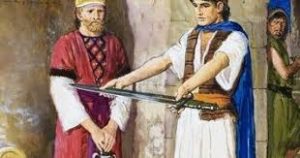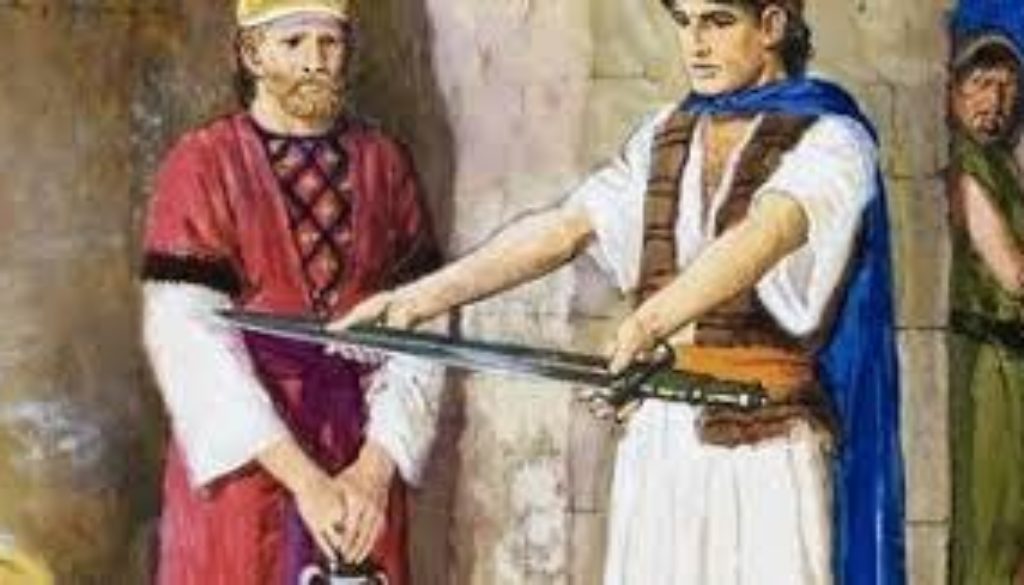1 Samuel 21:1-9 David in Nob

David was warned by Jonathan that the king indeed sought his life. David in on the run but he needs supplies. He stops in Nob to visit the priest and get what he can.
David is alone in his flight from the king. He has no troops to support him or even a friend to pass him supplies. He has no money to buy bread and no weapon to defend himself with. What he does have is his wits and his Lord.
I’m concerned with David’s newfound freedom with the truth. He told a partial truth in our last story but today his words are FAR from the truth. David could be alluding to a much earlier conversation with Saul and using that as a way to hedge his true state. But he is definitely leading Ahimelech to a false conclusion that he is about the king’s urgent business. Would he eventually ask for the Lord’s forgiveness for his deception? Or did he believe it was warranted and necessary?
Let’s see where our story takes us today under the hand of the Holy Spirit.
♥ ♦ ♥
David fled Gibeah and headed south. He is desperate and in need. He has no food or weapons. These are crucial for his survival. He has no means to buy bread and he has to be careful so he is not seen and arrested. David goes to the one place he knows he can find relief; the house of the Lord.
Nob is not far from Gibeah but it takes David all day to make the journey. He had to dodge patrols and remain hidden from other travelers. He cannot afford to have anyone let slip his current whereabouts or his destination. He is too well known to go unnoticed and anyone loyal to Saul probably knows that Saul is searching for him.
David reaches Nob late in the day. The evening sacrifice is long over and the Tabernacle has ceased its daily routine. The priest tasked with night time duties is the only one in residence at this time of night. Most in the city are beginning their night time routines. David carefully makes his way to the Tabernacle. Ahimelech the priest sees him approaching.
Ahimelech recognizes David immediately. He is not used to seeing soldiers in the city and certainly not alone and at night. Something doesn’t feel right to him. He approaches David and questions him.
“Why are you alone, and no one with you?” (verse 1b).
David had worked on his answers all day. He couldn’t come out and say he was running from the king who wanted to kill him. He would be gambling with his life on the hearer’s loyalty to the king. He didn’t want to put anyone in the position of having to choose whether to report him or not. He had settled on a story that could be taken as truth, so long as no one checked the facts too closely. It was also cleverly designed to prevent future questions.
“The king has charged me with a matter and said to me, ‘Let no one know anything of the matter about which I send you, and with which I have charged you.’ I have made an appointment with the young men for such and such a place.” David pauses to make certain his listener is coming along on his false trail. When no resistance appears, he continues with his ruse. Now then, what do you have on hand? Give me five loaves of bread, or whatever is here” (verses 2-3).
The priest is not expecting this request. A request for prayers, possibly, but food, very unexpected. This was not a grocer. But he wants to help David who is on the king’s errand.
“I have no common bread on hand, but there is holy bread–if the young men have kept themselves from women” (verse 4b). This isn’t exactly allowed but David’s circumstances seem dire.
David is quick to respond in the affirmative. “Truly women have been kept from us as always when I go on an expedition. The vessels of the young men are holy even when it is an ordinary journey. How much more today will their vessels be holy?” (verse 5).
Ahimelech breathes a sigh of relief that the conditions set forth are met. He is willing to bend the rules a little but not outright break them, even for David, Saul’s champion.
David waits while Ahimelech retrieves the bread from the Tabernacle. It will be replaced first thing in the morning.
Someone else is waiting and watching. It is someone a bit more suspicious of David. He has heard rumors floating about regarding the king’s displeasure with David. This man was always on the lookout for something he might be able to use to his advantage. He was Doeg the Edomite, Saul’s chief herdsmen. He hoped to curry the king’s favor with a report on David’s movements.
When Ahimelech returned with the bread David addressed his other urgent need.
Then have you not here a spear or a sword at hand? For I have brought neither my sword nor my weapons with me, because the king’s business required haste” (verse 8).
Ahimelech is surprised by David’s request and his explanation. This was a house of worship, not a house of war and wouldn’t a soldier have his weapons at the ready all the time? But who was he to question David, the Saul’s champion. He quickly remembered the one weapon that was in the Tabernacle. The one David had placed there himself.
“The sword of Goliath the Philistine, whom you struck down in the Valley of Elah, behold, it is here wrapped in a cloth behind the ephod. If you will take that, take it, for there is none but that here” (verse 9a).
David’s eyes light up at the mention of that sword. He had forgotten he had it placed here in Nob. It was after all his spoils of war.
“There is none like that; give it to me” (verse 9b).
Ahimelech retrieves Goliath’s sword and gives it to David. David ties the scabbard across his back and tests its weight. It is a good weapon and he is stronger now than he was the last time he held it. It is still too long to be tied at his waist for it would drag the ground. He will practice drawing it from his back a little later. For now he thanks Ahimelech.
As David leaves Ahimelech he has to walk as a man who is not in hiding. Ahimelech must not know of David’s true status. David walks boldly down the streets of Nob until he is out of sight of the Tabernacle.
Doeg crosses his path and makes sure that David sees him. He hopes to wring coins from David in exchange for his silence. But David walks past him as if he hasn’t seen him. Doeg moves to intercept David but a look and one word from David stops him in his tracks.
David fixes Doeg with steel eyes and growls “Don’t” with a shake of his head added for emphasis. David can only hope the Edomite will be frightened enough to give David time to escape. As soon as David can he returns to the shadows and ensures that Doeg has lost sight of him.
(to be continued)
♥ ♦ ♥
Father God, You carried David through some ENORMOUSLY dangerous situations. He ‘bent the rules’ for survival. And in later references he wasn’t condemned for it.
I have a question regarding this event. Did David eat the bread of the Tabernacle twice? In this story it sounds like David is pretending there are others with him but when Jesus references David eating the consecrated bread He says “Have you not read what David did when he and his companions were hungry? He entered the house of God and he and his companions ate the consecrated bread” (Matthew 12:3-4a). I would think that You would know if he was alone or not. Was Jesus allowing the people to maintain a long held belief or was He referring to another event? I guess I should wait and see. We are not done with David’s story yet.
So if this was a separate incident did he need to repent for his actions? Did You call him to account for his stretched truth? You tell us that he was a man after Your own heart. YOUR heart has no deceit in it. But David was also NOT You. He was a man. Did he lack faith that You would protect him without the subterfuge? Or did he believe You condoned if not approved of it? I realize his life was at stake and he was living before Your completed promise, but where were the lines drawn for him? Where are they for those who find themselves faced with life or death situations now and in the time of tribulation? I KNOW denying You is not an option but what about stretching the truth like David?
I PRAY I never have to find out for myself! Help me walk in the truth more every day. Including the truth of Your love. Death is not the end and if telling the truth means my death someday, that is the day we will finally be together. You weren’t through with David and I believe if he had been truthful You would have met him at the point of his need and protected him. Those years on the run were for more than training in leadership. They were training ground for David’s faith. Thank You for the training I have already received. I would love to have stronger faith but I’m afraid to ask because it would involve training grounds for me too. Please be gentle with me!




